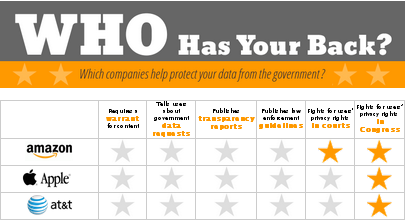Articles by Electronic Frontier Foundation (EFF)

Internet in Syria goes dark, leaving questions and uncertainty
Internet traffic between Syria and Western online services had plummeted drastically, indicated that the country’s connection to the wider Internet had been shut down.

The Trans-Pacific Partnership and the threat it poses to the Internet
The United States and ten governments from around the Pacific are meeting yet again to hash out the secret Trans-Pacific Partnership agreement (TPP) on 15-24 May 2013 in Lima, Peru. The TPP is one of the worst global threats to the Internet since the ACTA (Anti-Counterfeiting Trade Agreement).

New report reveals which U.S. Internet companies protect user data
EFF’s new “Who Has Your Back?” report examines the policies of major Internet companies — including ISPs, email providers, cloud storage providers, location-based services, blogging platforms, and social networking sites — to assess whether they publicly commit to standing with users when the government seeks access to user data.

Support for online free speech widespread in the Arab world
In 2012, we saw Jordanians and Egyptians instituting SOPA-style protests against regulatory measures in their countries, and in Lebanon, we saw digital protests crush the Lebanese Internet Regulation Act.

U.S. House of Representatives passes controversial cybersecurity bill
For the second year in a row, the U.S. House of Representatives voted to approve CISPA, a bill that would allow companies to bypass all existing privacy law to spy on communications and pass sensitive user data to the government.

Egyptian bloggers face absurd legal charges, harassment
Blogger Alaa Abd El Fattah is being investigated and has received an arrest warrant for inciting “aggression” against members of the Muslim Brotherhood.

Egyptian bloggers face absurd legal charges, harassment
Blogger Alaa Abd El Fattah is being investigated and has received an arrest warrant for inciting “aggression” against members of the Muslim Brotherhood.

South Korea’s “three strikes” copyright law being challenged
South Korea’s Human Rights Commission has recommended that a “three strikes” law on copyright infringement be re-examined, given its unclear benefits, and its potential to violate the right to receive and impart information.
